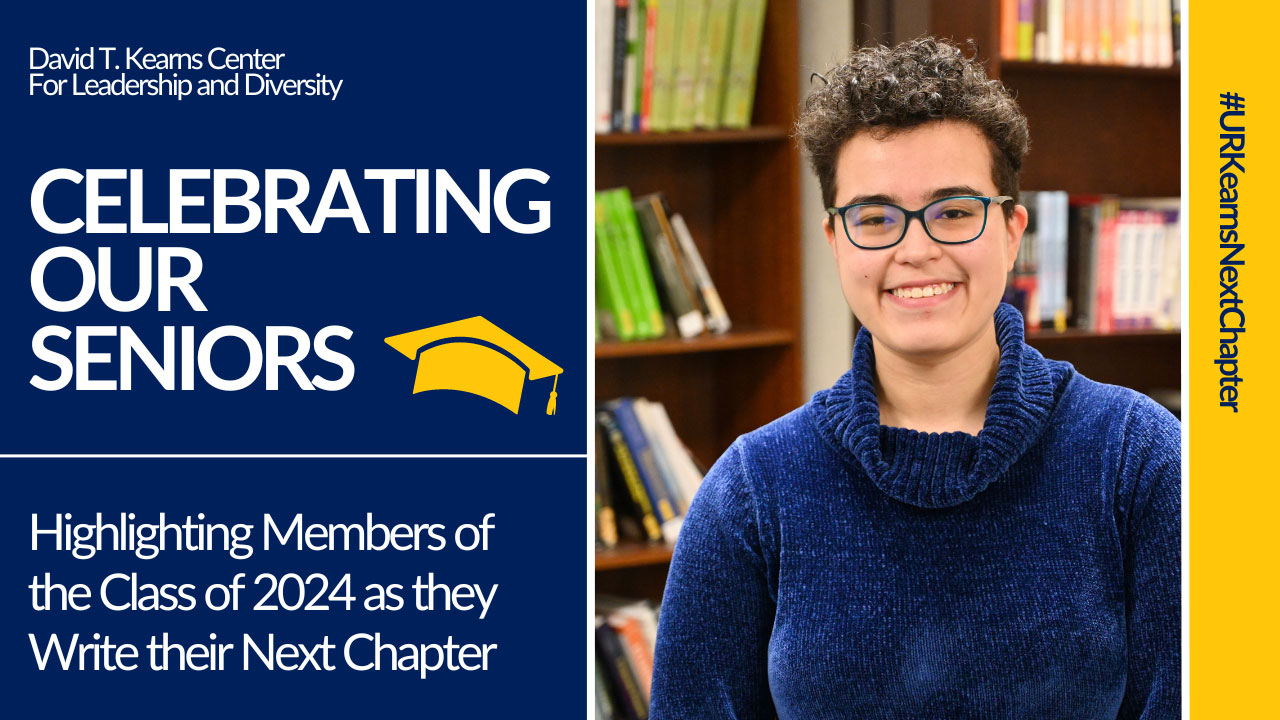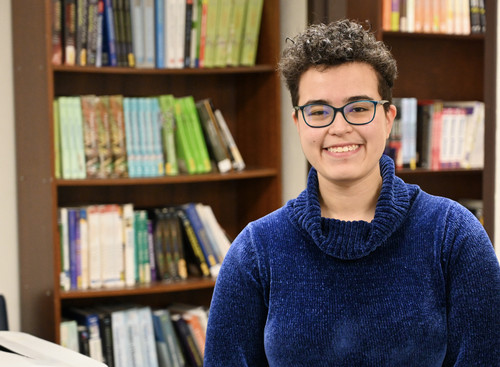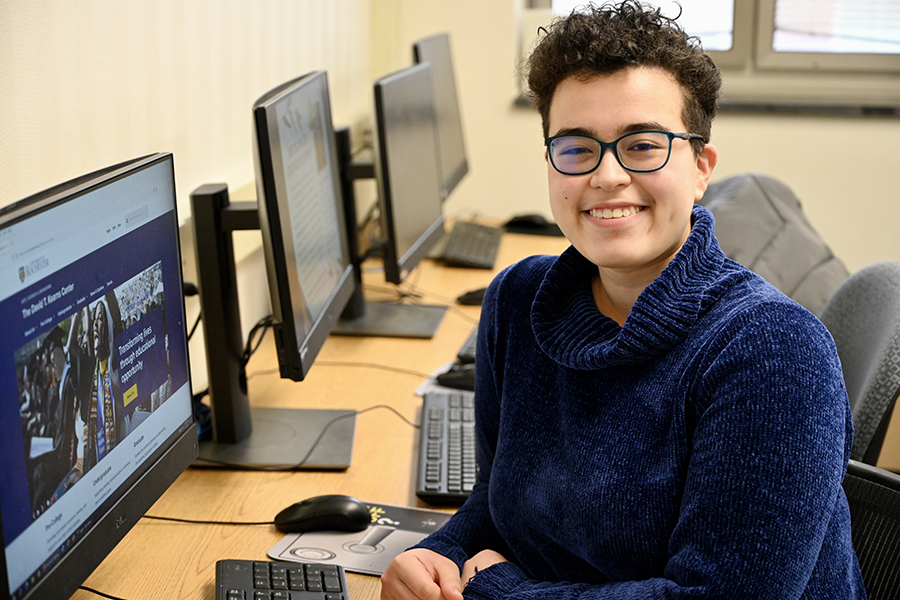Celebrating Our Seniors: Stephany Correa-Diaz
Highlighting Members of the Class of 2024 as they Write their Next Chapter

Graduation…then what? For seniors in high school and college, graduation is the ultimate punctuation mark on a portion of their academic career and the natural closing of a chapter. But what comes afterwards? The next chapter our graduates will write will be about their new beginnings, whether that is in a professional career, in their postsecondary education journey or in their opportunities to make a continued commitment to Meliora, finding ways to make the world ever better. We want to take some time to celebrate our Kearns Center affiliated seniors on all their achievements and share what their education has meant to them and the ways in which the Kearns Center has impacted their lives. This series will highlight several seniors in our programs at the Kearns Center who are ready for their next chapter.
Introducing: Senior, Stephany Correa-Diaz
Program: Ronald E. McNair Post-Baccalaureate Achievement Program
Major: Geomechanics at the Hajim School of Engineering & Applied Sciences
Next Chapter: Graduate school at the University of Colorado, Boulder
The next chapter for University of Rochester senior Stephany Correa-Diaz is graduate school.

Correa-Diaz will graduate in May with a degree in geomechanics from the Hajim School of Engineering & Applied Sciences at the University of Rochester. The geomechanics program is offered jointly with the Department of Mechanical Engineering and Department of Earth and Environmental Sciences for students interested in the application of mechanics to problems associated with the environment - rivers, lakes and oceans, the atmosphere, and the earth.
After graduation Correa-Diaz will move to Colorado and start the masters of the environment (MENV) program at the University of Colorado, Boulder. The university describes the program as innovative and says it will help prepare students with the “knowledge, skills, and experience necessary to address the complex environmental challenges of the 21st Century.” Correa-Diaz says they feel a bit nervous but also excited about this new chapter and can’t wait to see what the future holds. “I feel great about graduating. I finished my major requirements and have learned a lot about sustainability and engineering through various experiences, which was my goal for college.” Correa-Diaz has a passion for sustainability and hopes to get into energy consulting after grad school. “I want to help promote the transition towards renewable energy and net-zero emissions, and I think helping businesses move towards that goal is the next logical step. The technology for a world with net-zero emissions is out there, we just need to implement it.”
Correa-Diaz says it was the capstone project and the classes the MENV program offered that really helped them make their decision on their next chapter. “I got acceptance letters for CU Boulder, Stanford, Wake Forest, USC Viterbi, and University of Maryland, College Park” says Correa-Diaz, adding that the MENV program best suited their career interests.
Correa-Diaz came to Rochester from Las Vegas, Nevada and was drawn to Rochester because of Hajim’s engineering programs. The Hajim School of Engineering & Applied Sciences is ranked in the top 50 best engineering schools in the country, coming in at number 42 according to the latest US News and World Report: Best Graduate Schools rankings from last year. Not only was Correa-Diaz moving to an entirely new state, but they were also attending college during a global pandemic which added another layer to the many emotions students face when starting college. “I arrived during the pandemic, so I felt the freedom of starting college in a new state, but I also felt very lost. The only person I knew at the U of R was my twin, so I put a lot of effort into getting to know people in clubs, like SALSA and QSOC, over Zoom and in small socially distanced gatherings.” It was that first semester at Rochester that Correa-Diaz was introduced to the Kearns Center through the CASC 149 course, Culture of the Academy II, which at the time was online.

A year later while Correa-Diaz was in their sophomore year, they were introduced to the McNair Program through an academic advisor at the Kearns Center. After applying and interviewing for the program, they were inducted in 2022. “The Kearns Center and McNair program were the backbones of my college career” says Correa-Diaz. “The McNair program has helped me find research on campus through its funding, so I was able to work with carbon capture research for the first time in my career. I was also able to go to my first conference through the McNair program, which was exciting and taught me a lot about the academic world and networking. This program has also provided me with a lot of academic support during my search and applications for graduate schools; the application process would have been much more difficult to complete without the McNair program.” Someone who has been able to see Correa-Diaz’s growth firsthand is George McCormick, the McNair Scholars Program manager at the Kearns Center. "Stephany has the ability to turn their intellectual curiosity into action: They are an inspired researcher and thinker.”
The Kearns Center and the McNair program work to expand educational opportunity for first-generation college students, students who are low-income or underrepresented minority students. The McNair program is designed specifically to increase the numbers of low-income, first-generation, and underrepresented minority undergraduates who pursue PhD degrees and go on to careers in research and teaching at the university level. The highly selective program offers students the opportunity to engage in paid undergraduate research and gain support in the graduate school application process. “Whether it's providing textbooks or academic counseling, I have been able to get this far because of the support these programs gave me during my successes and the difficult challenges I faced” says Correa-Diaz. “I am truly grateful for the Kearns and McNair staff; thank you for believing in me and helping me tell my story to find the opportunities that best fit my goals.”
For those approaching their senior year, knowing this time next year it will be them walking across that stage to receive their diplomas, Correa-Diaz had this piece of advice: “Your hard work here will pay off, even if it takes some time. Whether it's getting a job or applying to graduate school, tell your story proudly, because there are many things that have happened during your time here because you got the ball rolling. I wish you all the best with your future plans!”
Read more about the next chapters for our graduating seniors in our 2024 “Celebrating our Seniors” series. What is your next chapter? Share it with us, using #URKearnsNextChapter.
